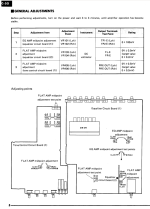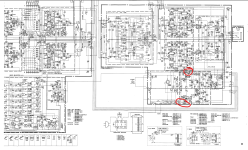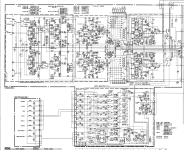Hello,
I have a question that may be considered as a general one or it may go to more details and become a special case.
My preamp becomes unusually hot after even a short use. Being a preamp, it does not need to work hard with those power transistors generating enough juice to feed the speakers. Why do they turn into hot coals in my case? Should I try to replace the transistors that sit on the radiators?
Another concern is the very sensitive VR adjustments of EQ Amp midpoint. Very hard to set it to a stable required rating. Can that be a possible cause for the output transistors to heat up? There are three points of adjustments for this preamp.
Where should I look further to try to fix the overheating problem?
The preamp is a Yamaha C-50.
I have a question that may be considered as a general one or it may go to more details and become a special case.
My preamp becomes unusually hot after even a short use. Being a preamp, it does not need to work hard with those power transistors generating enough juice to feed the speakers. Why do they turn into hot coals in my case? Should I try to replace the transistors that sit on the radiators?
Another concern is the very sensitive VR adjustments of EQ Amp midpoint. Very hard to set it to a stable required rating. Can that be a possible cause for the output transistors to heat up? There are three points of adjustments for this preamp.
Where should I look further to try to fix the overheating problem?
The preamp is a Yamaha C-50.
Attachments
If its working (even hot), transistors are fine and should not be replaced.
You need to find reason why it draws more current. Could be old dry capacitor.
You need to find reason why it draws more current. Could be old dry capacitor.
Simple answer is no 🙂Should I try to replace the transistors that sit on the radiators?
They get hot because of the voltage dropped across them and the current flowing through them (W=I*V) and any replacement would be just the same. I'm guessing the transistors on the heatsinks are TR440 and TR443 which are series voltage regulators in the power supply and they will run hot.
I would doubt there is any issue and its normal for lots of commercial gear to run quite hot in parts often discolouring the PCB if its seen a lot of hours use. All normal.
These are simple DC offset adjustments and with discrete circuitry like this the set point will wander with temperature change. With the preamp fully warmed (top on) quickly remove the cover and check the settings aiming for as near zero volts as possible.Another concern is the very sensitive VR adjustments of EQ Amp midpoint. Very hard to set it to a stable required rating. Can that be a possible cause for the output transistors to heat up? There are three points of adjustments for this preamp.
I checked the large caps (C479,C480) in the power path, both 1000/50V and they are almost 100% up to the specs. No visual harm on them as well. Solder joints look good and feel Okay to a touch.If its working (even hot), transistors are fine and should not be replaced.
You need to find reason why it draws more current. Could be old dry capacitor.
Will do the suggested measurements again and see how it goes. One thing I notice is that I hear a slight difference in the balance between the channels. Left is a bit higher volume when the pot is set in the middle. I cleaned the pot several times as well as the volume control. Still hear that. May be my ear. 😢These are simple DC offset adjustments and with discrete circuitry like this the set point will wander with temperature change. With the preamp fully warmed (top on) quickly remove the cover and check the settings aiming for as near zero volts as possible.
So it didn't get this hot before, or you just didn't notice?
Or the unit is new to you and you just think it shouldn't get this hot?
Or the unit is new to you and you just think it shouldn't get this hot?
It is new to me. It had one channel out at the time I got it. It appeared that it had a cold solder on the fancy volume control of that unit. Cleaned it up and re-flowed. It started working after that. I was so happy about it that I didn't pay attention to the heat. Now I started to notice. Never had a unit that gets that hot before. 🤷♂️So it didn't get this hot before, or you just didn't notice?
Or the unit is new to you and you just think it shouldn't get this hot?
Not uncommon unfortunately and is usually due to slight mismatch between the two gangs of the volume control.One thing I notice is that I hear a slight difference in the balance between the channels. Left is a bit higher volume when the pot is set in the middle. I cleaned the pot several times as well as the volume control.
If you want to delve further for your own satisfaction then you would need a suitable signal source and an oscilloscope to look at the signal levels around the volume control. Just in case you are wondering we can say that the transistors play no part in the overall the gain of each channel, the gain is set by just a few passive components in each stage. The ganged rotary controls are where the big errors are found.
The output stage could be a class A design that normally runs hot.
The regulated power supply has two fairly large 30W transistors (TR440 & TR443 = 2SD880) mounted on the heat sinks near the transformer.
These likely generate most of the heat and the case is vented in that area.
The unit is also rated for 40W max power consumption.
So I suspect the heat you observe is normal.
The regulated power supply has two fairly large 30W transistors (TR440 & TR443 = 2SD880) mounted on the heat sinks near the transformer.
These likely generate most of the heat and the case is vented in that area.
The unit is also rated for 40W max power consumption.
So I suspect the heat you observe is normal.
Last edited:
The schematic has lots of useful info about the voltage that should be expected in multiple points. I wish I knew the right succession of steps to follow the flow and track down where the possible misconduct (if any) starts.The final output stage isn't very current hungry
But I may be barking at the wrong tree and everything is working tip-top, just as the guys at Yamaha designed it.
Perhaps the voltage into the regulators is too high. For example, I have a Schiit Loki tone control module that requires a 16vac wall-wart but came with a measured 19vac that resulted in +-21vdc into the 317 regulators. The PCB spread the heat throughout the unit. I replaced the big wall wart with a smaller 12vac. This worked even though the regulator input was marginal.Where should I look further to try to fix the overheating problem?
The preamp is a Yamaha C-50.
From a quick search, it appears that the C50 and other Yamaha pres from that era do run hot:
https://audiokarma.org/forums/index.php?threads/opinions-on-yamaha-c-50-pre-amp.115598/
https://audiokarma.org/forums/index.php?threads/opinions-on-yamaha-c-50-pre-amp.115598/
The schematic has lots of useful info about the voltage that should be expected in multiple points.
I really don't think there will be any problem.
My C-80 got very, very hot. I took off the cover, cut a big hole in it and added on a perforated lid cover when I renewed the power supply capacitors [ which had bulged and discoloured] as the new caps were taller by 6mm. I took off the bottom panel and added some 10mm vent holes After that it ran a lot cooler.
I'm actually sorry I sold on the C-80, it was redundant tho when I got the new crossover with DSP.
I'm actually sorry I sold on the C-80, it was redundant tho when I got the new crossover with DSP.
I completely understand your apprehension since a device (if it's one of those that doesn't heat up very much by design, e.g. Class A amps) that runs hot doesn't please anyone.to try to fix the overheating problem?
Generally speaking AFAIK preamps does rarely have ventilation holes on the cover, but this one does.
It's definitely a sign that he doesn't work cold by design. 😉
As matter of fact, everyone before has already told you not to worry about that heat generated.
And note that most of them are infinitely more experienced than me!
In a closed box with not too much ventilation it may be a bit more than "nothing" 🙂That 40W is not nothing.
But I would check the voltages before and after the regulator transistors and compare them to the values in the service manual.
In a closed box with not too much ventilation it may be a bit more than "nothing" 🙂
😉Generally speaking AFAIK preamps does rarely have ventilation holes on the cover, but this one does.
- Home
- Source & Line
- Analog Line Level
- Preamp heating up


